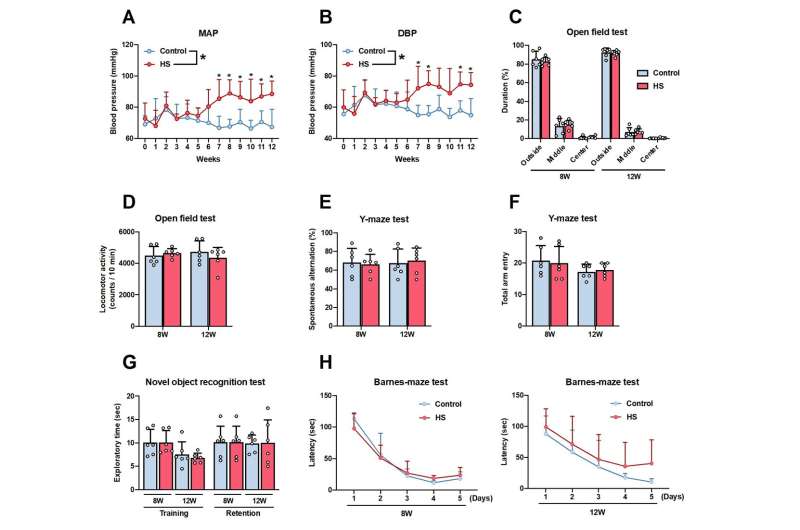This article has been reviewed according to Science X's editorial process and policies. Editors have highlighted the following attributes while ensuring the content's credibility:
fact-checked
peer-reviewed publication
proofread
How excessive salt consumption is linked to cognitive disorders and high blood pressure

Dementia is defined as the loss of cognitive functioning—including thinking, remembering, and reasoning—and is very prevalent in Japan. Currently, the treatment satisfaction for dementia is among the lowest and no drug therapy is available to cure the disease. With a rapidly aging global population, the development of dementia preventive and therapeutic drugs is critical.
Cognitive impairment has been linked to the consumption of excess table salt, a ubiquitous food seasoning. High salt (HS) intake can also lead to hypertension. To prevent adverse health outcomes, the World Health Organization recommends limiting salt intake to less than 5 g per day.
The involvement of angiotensin II (Ang II)—a hormone that plays a key role in regulating blood pressure and fluid balance—and its receptor "AT1," as well as that of the physiologically important lipid molecule prostaglandin E2 (PGE2 and its receptor "EP1" in hypertension and neurotoxicity is well-recognized. However, the involvement of these systems in HS-mediated hypertension and emotional/cognitive impairment remains elusive.
To this end, a recent study published in the British Journal of Pharmacology thoroughly evaluated the aspects of HS-mediated hypertension and emotional/cognitive impairment. The study was performed by a team of collaborating researchers from Japan, and has shown how hypertension, mediated by the crosstalk between Ang II-AT1 and PGE2-EP1 causes emotional and cognitive dysfunction.
Author Hisayoshi Kubota from Fujita Health University's Graduate School of Health Science comments, "Excessive salt intake is considered a risk factor for hypertension, cognitive dysfunction, and dementia. However, studies focusing on the interaction between the peripheral and central nervous system have not sufficiently investigated this association."
According to the published data, the addition of excessive phosphates to the protein "tau" is primarily responsible for this emotional and cognitive consequences. The findings are particularly noteworthy because tau is a key protein of the Alzheimer's disease.
The team first loaded laboratory mice with an HS solution (2% NaCl in drinking water) for 12 weeks and monitored their blood pressure. "The effects of HS intake on emotional/cognitive function and tau phosphorylation were also examined in two key areas of the mouse brain—the prefrontal cortex and the hippocampus," explains Prof. Mouri. Next, they also studied the involvement of the Ang II-AT1 and PGE2-EP1 systems in the HS-induced hypertension and neuronal/behavioral impairment.
The results were remarkable and encouraging: The brains of the experimental mice had several biochemical alternations. At the molecular level, besides the addition of phosphates to tau, the researchers also observed a decrease in the phosphate groups linked to a key enzyme called "CaMKII"—a protein involved in brain signaling.
Moreover, changes in the levels of "PSD95"—a protein that plays a vital role in the organization and function of brain synapses (connection between brain cells)—were also evident. Interestingly, the biochemical changes were reversed after the administration of the antihypertensive drug "losartan." A similar reversal was observed after knocking out the EP1 gene.
Overall, these findings suggest that angiotensin II-AT1 and prostaglandin E2-EP1 systems could be novel therapeutic targets for hypertension-induced dementia.
Prof. Mouri concludes by saying, "This study is of particular social and economic importance because the annual social cost of dementia treatment in Japan is surging like never before. Therefore, developing preventive and therapeutic drugs for dementia seems critical for Japan's rapidly aging population."
More information: Hisayoshi Kubota et al, High salt induces cognitive impairment via the interaction of the angiotensin II‐AT 1 and prostaglandin E2‐EP 1 systems, British Journal of Pharmacology (2023). DOI: 10.1111/bph.16093



















